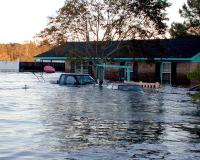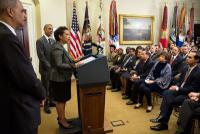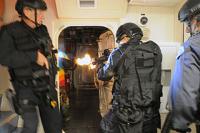-
Following indictments, China’s military reduces its commercial cybeespionage against American companies

The People’s Liberation Army (PLA) has reduced its cyberespionage activity targeting American companies since five PLA officers were indicted by the Department of Justice in May 2014. “The indictments had an amazing effect in China, more than we could have hoped for,” said one expert. In April, Obama signed an executive order calling for impose economic sanctions on individuals and entities that take part in or benefit from illicit cyber-activities such as commercial espionage. “If the indictments had the effect of getting the PLA to scale down, then sanctions likely will have a wider effect on other Chinese state-sponsored groups,” says another expert.
-
-
Flawed U.S. Senate report on CIA torture doomed to "eternal controversy": Researcher

The U.S. Senate summary report on the allegations of CIA torture during the “war on terror” failed to live up to its original purpose, a Stanford scholar said. The researchers says that the U.S. Senate’s 2014 summary report on alleged CIA torture and interrogation Four key errors have doomed the Senate report to “eternal controversy,” she said: “It was not bipartisan, took too long to write, made little effort to generate public support along the way, and produced a declassified version that constituted a tiny portion of the full study.”
-
-
DHS S&T calls on non-traditional performers to offer solutions to tough threats

DHS Science and Technology Directorate (S&T) last week announced its first Innovation Other Transaction Solicitation (OTS) aimed at non-traditional performers such as technology start-ups to offer solutions to some of the toughest threats facing DHS and the homeland security mission. Awarded through Other Transaction Solicitation HSHQDC-16-R-B0005, the first call for proposals is looking for solutions to improve situational awareness and security measures for protecting Internet of Things (IoT) domains.
-
-
Better FEMA options for increasing the affordability of flood insurance

FEMA currently does not have the policy analysis capacity or necessary data to comprehensively analyze different options for making flood insurance more affordable. A new report identifies an approach for the Federal Emergency Management Agency (FEMA) to evaluate policy options for making premiums through the National Flood Insurance Program (NFIP) more affordable for those who have limited ability to pay.
-
-
Terror attacks in Paris and California expose modern society’s lack of resilience
Our complex global society lacks resilience. The root cause of our vulnerability is the structure of the global economy: highly interconnected, complex, and filled with turbulence. Major disasters can occur unexpectedly, and even minor incidents can cascade into significant human and financial losses. Emerging pressures such as climate change and urbanization will only intensify the potential for extreme events and severe disruptions. Risk management makes sense in a stable environment with predictable events, but in today’s more complex risk landscape — the new normal — it is inadequate for dealing with fast-moving, unfamiliar threats that may cascade into disasters. The good news is that brittleness is not inevitable. It is a fundamental design flaw. Resilience — the capacity to survive, adapt, and flourish in the face of disruptive change — is a basic characteristic of all living systems, from individual creatures to entire ecosystems. In this age of turbulence, resilience has become a prerequisite for continued prosperity.
-
-
FBI unable to break 109 encrypted messages Texas terror attack suspect sent ahead of attack

FBI director James Comey told lawmakers this week that one of the suspects in the foiled terror attack in Garland, Texas, in May had exchanged 109 messages with sources in a “terrorist location” overseas ahead of the attack. U.S. intelligence and law enforcement agencies, however, have not been able to break into and read those messages because they were exchanged on devices equipped with end-to-end encryption software which, security services in the United States and Europe argue, make it impossible to monitor and track terrorists and criminals.
-
-
Assad’s future; Israel’s missile defense; U.S. overseas bases

Israel’s chief-of staff said that the likelihood of the Assad-Hezbollah-Iran axis winning the war in Syria is “zero” (his words). The Alawite community is too small to continue and provide soldiers to Syria’s army; both Iran and Hezbollah appear to have concluded that the cost of maintaining Assad in power is just too high; and Russia has decided against sending ground troops. Israel has successfully tested the Arrow-3, its anti-ballistic system designed to intercept long-range missiles. The Pentagon proposes creating an architecture of hub-and-spokes military bases overseas to fight terrorists.
-
-
WH finalizing executive order tightening background checks of gun buyers

Sources say that the White House is about to announce a new executive order to expand background checks of individuals wishing to purchase guns. One proposal being considered would designate more sellers as high-volume dealers, closing a legal loophole which allows many sales conducted online or at gun shows to escape existing background check provisions. Two other developments on the gun front: On Thursday, Connecticut governor Dan Malloy said he would sign an executive order which would bar people on the government’s terrorism watch lists from buying guns in Connecticut; in the House, Democrats demand that a 17-year ban on government-funded research into violence involving firearms be ended.
-
-
U.K. arrests record number of terrorism suspects, especially women, teenagers

According to the U.K. Home Office quarterly bulletin, 315 terror suspects – a record — have been arrested in the United Kingdom in the past year, with a sharp increases in arrests of women and teenagers. Therise in the number of terrorism-related suspects arrested is a reflection of the determined effort by the police and security services to address the ISIS threat and stem the flow of Britons to, and from, Syria.
-
-
U.K. university suspends Islamic society over hosting hate speakers

Queen Mary University of London has suspended the Islamic society at the university after the students’ union has launched an investigation into possible violations of protocols and procedures by the society. the society has been accused in the past of hosting events in which radical Islamist speakers, including speakers associated with Islamist fundamentalist groups. The U.K. government said that at least seventy events featuring hate speakers were held on U.K. campuses last year.
-
-
Loretta Lynch: No evidence San Bernardino shooters part of a cell

Some U.S. media reports said one of the San Bernardino shooters, Syed Rizwan Farook, may have been plotting an earlier attack in California with someone else, possibly as early as 2012. U.S. attorney general, Loretta Lynch, on a visit to London today (Wednesday), said, however, that there is no evidence yet that Farook and his wife had planned any other attacks or were part of a wider conspiracy.
-
-
Civil liberties coalition condemns cybersecurity bill

Civil libertarians in the United States have a new ally in the fight against the new surveillance bill now being considered in Congress: librarians. The critics of the bill call it both “unhelpful” and “dangerous to Americans’ civil liberties.” House speaker Paul Ryan (R-Wisconsin) has been actively pushing for reconciliation of two bills, the Protecting Cyber Networks Act (PCNA) and the National Cybersecurity Protection Advancement with the Cybersecurity Information Sharing Act of 2015 (CISA), which passed a Senate vote in October.
-
-
Paris attacks expose weaknesses in Europe’s security structure

The 13 November attacks in Paris offered a painful demonstration of Europe’s security loopholes which the terrorists exploited to their advantage. The attacks should serve as a wake-up call to Europeans that the continental security structure, built in another era, is no longer sufficient and needs to be adapted to new circumstances. Whether or not such adaptations can be made, and made in time before the terrorists decide to launch another attack, is an open question.
-
-
Improving police responses to mass shootings

Before Columbine, law enforcement acted on the assumption that mass casualty incidents would involve a barricaded lone shooter who could be isolated, or a hostage situation in which the attackers would engage in negotiation before they killed more people. Thus, protocols established after the 1966 sniper attack at the University of Texas, called for first responders in the United States to set up a perimeter around the site of the shooting, gather as much information as possible, and then wait for specially trained assault teams, hostage negotiators, medics, and other specialists to arrive. “The assumption,” one expert said, “was that time was on their side.” Police forces arriving on the scene of a shooting no longer entertain this assumption.
-
-
It’s time to repeal the gun industry’s exceptional legal immunity

Coming up with effective and realistic solutions to curb gun violence is not easy. Guns pose a tricky dilemma, because they can be used to do good or bad things. They can be used to commit heinous crimes, but they can be used to protect lives as well. The challenge for lawmakers is to come up with ways to reduce the risk of criminal misuse of guns while preserving and even promoting the likelihood of guns being used in beneficial ways. Ensuring that every firearm manufacturer and dealer operates as safely and responsibly as possible should be one piece of the puzzle. A key way to ensure that gun companies have the right incentives would be to repeal the Protection of Lawful Commerce in Arms Act. Enacted in 2005, this federal law gave gun sellers a special immunity from legal responsibilities, which is not enjoyed by any other industry. Gun manufacturers and dealers should not be subject to any extraordinary forms of liability that do not apply to other products. They should not be liable, for example, merely because a firearm is a weapon that is capable of being used to do harm. But if a gun manufacturer or dealer fails to take basic, reasonable precautions in distributing products, it should be held accountable under the law just as an irresponsible company in any other business would be. With the risks of firearms in the wrong hands becoming ever more apparent, Congress should reconsider its regrettable decision to give the gun industry special immunity from legal responsibility.
-
More headlines
The long view
What Does Netflix’s Drama “Adolescence” Tell Us About Incels and the Manosphere?
While Netflix’s psychological crime drama ‘Adolescence’ is a work of fiction, its themes offer insight into the very real and troubling rise of the incel and manosphere culture online.
A Shining Star in a Contentious Legacy: Could Marty Makary Be the Saving Grace of a Divisive Presidency?
While much of the Trump administration has sparked controversy, the FDA’s consumer-first reforms may be remembered as its brightest legacy. From AI-driven drug reviews to bans on artificial dyes, the FDA’s agenda resonates with the public in ways few Trump-era policies have.
The Center Can Hold — States’ Rights and Local Privilege in a Climate of Federal Overreach
As American institutions weather the storms of executive disruption, legal ambiguity, and polarized governance, we must reexamine what it means for “the center” to hold.
How to Reverse Nation’s Declining Birth Rate
Health experts urge policies that buoy families: lower living costs, affordable childcare, help for older parents who want more kids
Foundation for U.S. Breakthroughs Feels Shakier to Researchers
With each dollar of its grants, the National Institutes of Health —the world’s largest funder of biomedical research —generates, on average, $2.56 worth of economic activity across all 50 states. NIH grants also support more than 400,000 U.S. jobs, and have been a central force in establishing the country’s dominance in medical research. Waves of funding cuts and grant terminations under the second Trump administration are a threat to the U.S. status as driver of scientific progress, and to the nation’s economy.
The True Cost of Abandoning Science
“We now face a choice: to remain at the vanguard of scientific inquiry through sound investment, or to cede our leadership and watch others answer the big questions that have confounded humanity for millennia —and reap the rewards.”
